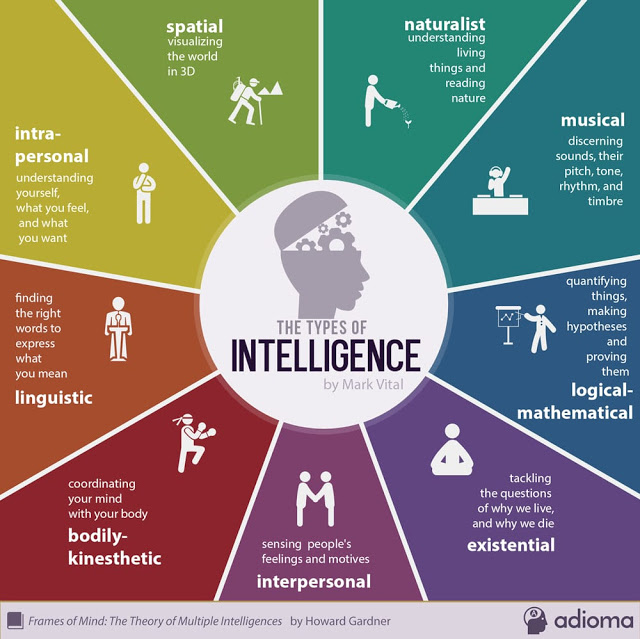by Staff writer
In 1983, American developmental psychologist Howard Gardener described 9 types of intelligence:
1. Naturalist (nature smart)
2. Musical (sound smart)
3. Logical-mathematical (number/reasoning smart)
4. Existential (life smart)
5. Interpersonal (people smart)
6. Bodily-kinesthetic (body smart)
7. Linguistic (word smart)
8. Intra-personal (self smart)
9. Spatial (picture smart)

Here is an overview of the different theories of intelligence Gardener described:
1. Naturalist Intelligence
2. Musical Intelligence
They are gifted with the ability to compose, sing and/or play instrument(s). Able to recognize sounds, tones and rhythm, they have a “good ear” for music.
3. Logical-Mathematical Intelligence
In other words, they are skilled at deductive reasoning, detecting patterns, and logical thinking.
They are also good at understanding complex and abstract ideas.
4. Existential Intelligence
Existential intelligence involves an individual’s ability to use collective values and intuition to understand others and the world around them. People who excel in this intelligence typically are able to see the big picture.
5. Interpersonal Intelligence
There are some professions that are a natural fit for people with interpersonal intelligence: politicians, teachers, therapists, diplomats, negotiators, and salesmen.
6. Bodily-Kinesthetic Intelligence
People with linguistic intelligence, such as J. R. R. Tolkien, are skilled at using language to achieve their goals.
Maya Angelou, William Shakespeare, and Oprah Winfrey are other famous people who have high linguistic intelligence.
Linguistic intelligence allows people to understand the order and meaning of words and to apply meta-linguistic skills to reflect on our use of language.
Linguistic intelligence is the most widely shared human competence and is evident in poets, novelists, journalists, and effective public speakers.
8. Intra-personal Intelligence
Intra-personal intelligence is the capacity to understand oneself and one’s thoughts and feelings, and to use such knowledge in planning and positioning one’s life.
Intra-personal intelligence involves not only an appreciation of the self, but also of the human condition. It is evident in psychologists, spiritual leaders, and philosophers. People with this type of intelligence are often shy. They are very aware of their own feelings and are self-motivated.
9. Spatial Intelligence
Sailors, pilots, sculptors, painters, and architects all exhibit spatial intelligence.
People with this kind of intelligence may be fascinated with mazes or jigsaw puzzles, or spend their free time drawing or daydreaming.
***
Credit:
Howard Gardner’s official website
Mark Vital of blog.adioma.com




Excellent way of describing, and nice article to obtain information about my presentation topic, which i
am going to deliver in university.
Hey there great website! Does running a blog such as this take a large amount of work?
I've very little understanding of computer programming but I was hoping to
start my own blog in the near future. Anyway, should you have
any suggestions or tips for new blog owners please share.
I understand this is off subject however I just needed to
ask. Thanks!